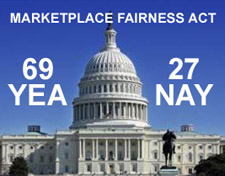Online Sales Tax Bill Clears Senate, Heads to House
By Kenneth CorbinEcommerceBytes.com
May 07, 2013

|
Over the strenuous opposition of eBay and allied advocacy groups, the Senate on Monday passed a bill that would authorize states to begin collecting sales taxes on purchases from out-of-state Internet retailers. The Marketplace Fairness Act, which the Senate approved by a 69-27 vote shortly before 7 p.m., would close what supporters describe as a loophole in current tax law that gives online sellers an unfair advantage over their physical counterparts. "This bill is about fairness. It's about leveling the playing field between the brick-and-mortar and online companies," Mike Enzi (R-Wyo.), the bill's sponsor, said on the Senate floor. The backers of the bill focused their remarks on debunking misconceptions about the bill, including the notion that it would impose a compulsory framework on states or create a new tax. "Congress is not forcing states to do anything. And if states do act, they're collecting taxes already due by consumers," Enzi said. "It's about collecting a tax that is already due." Consumers who live in the 45 states with a sales tax are currently required to report online purchases on which the tax wasn't collected at the time of sale on their state income returns, but most shoppers are either unaware of that obligation or ignore it. As a result, state officials have complained that billions of dollars in potential revenue go uncollected each year. The Marketplace Fairness Act has created something of a fissure in the retail and ecommerce world, with Amazon and groups like the National Retail Federation and Consumer Electronics Association supporting the measure, while eBay stood as one of the most vocal opponents, along with the anti-tax group Americans for Tax Reform, the Information Technology Industry Council and others. "The retail industry - the largest private sector employer - is rapidly changing and evolving," NRF Chairman Stephen Sadove said in a statement responding to the bill's passage. "Retailers compete for customers on many different levels, distribution channels and fronts, including service and selection, but they cannot compete on sales tax. Congress needs to address this sales tax disparity and allow retailers to compete freely and fairly. Retailers of all shapes, sizes and channels deserve a level playing field." Critics of the bill who concede that it would not technically amount to a new tax still protest the measure on a variety of other grounds, objecting to the complexity of state and local tax codes that, they say, would create an undue burden on small online sellers. They argue that the perverse effect of a bill intended to put retail competitors on equal footing would be to give an added advantage to large companies like Amazon that possess ample resources to manage the accounting tasks. "Today the Senate is voting whether to take a few more inches off the little guy," said Sen. Ron Wyden, a Democrat from Oregon, a state with no sales tax. "What you have is big businesses being given the ability to force - force, mind you - new regulations onto the startups, onto the small businesses." The bill's authors countered that the Marketplace Fairness Act both accounts for the complexity of state tax codes and provides special treatment for small businesses in the form of an exemption from the tax obligation for sellers with online or remote sales of less than $1 million per year. In order for states to be permitted to require online sellers to collect the tax, they must either sign on to an interstate tax-simplification framework or take other steps to harmonize their state and local codes. Participating states would also be required to make free software available to retailers to help with the tax calculations. eBay had been pressing for a small-seller exemption that would set the revenue threshold at $10 million, while also championing a minimum employee count to spare mom-and-pop operations "The contentious debate in the Senate shows that a lot more work needs to be done to get the Internet sales tax issue right, including ensuring that small businesses using the Internet are protected from new burdens that harm their ability to compete and grow," Brian Bieron, eBay's senior director of global public policy, said in a statement. "eBay will continue to focus on bringing greater balance to the legislation by protecting small businesses with less than $10 million in sales or fewer than 50 employees." Wyden and other members from non-sales tax states additionally objected that the bill would strip away their states' sovereignty by permitting outside taxing authorities to require businesses in their state to collect and remit sales taxes. The bill now heads to the House, where companion legislation has been introduced but faces an uncertain path forward. Bob Goodlatte (R-Va.), the chairman of the House Judiciary Committee, which plans to assert jurisdiction over the issue, issued a statement Monday evening expressing disappointment in the process by which the Marketplace Fairness Act passed the Senate, where it bypassed the committee process, and claiming that the bill's tax provisions are not "sufficiently simplified." Goodlatte also voiced concern that businesses could be subject to "aggressive state actions" and that the bill could grant regulators extra-jurisdictional authority, echoing the states-rights argument Wyden and other critics addressed on the Senate floor. "I am open to considering legislation concerning this topic but these issues, along with others, would certainly have to be addressed," Goodatte said. "The committee will also look at alternatives that could enable states to collect sales tax revenues without opening the door to aggressive state action against out-of-state companies." |
|
About the author:
Kenneth Corbin is a freelance writer based in Washington, D.C. He has written on politics, technology and other subjects for more than four years, most recently as the Washington correspondent for InternetNews.com, covering Congress, the White House, the FCC and other regulatory affairs. He can be found on LinkedIn here. |
Copyright 1999-2013. Steiner Associates LLC. All rights reserved.
http://www.ecommercebytes.com/cab/abn/y13/m05/i07/s01